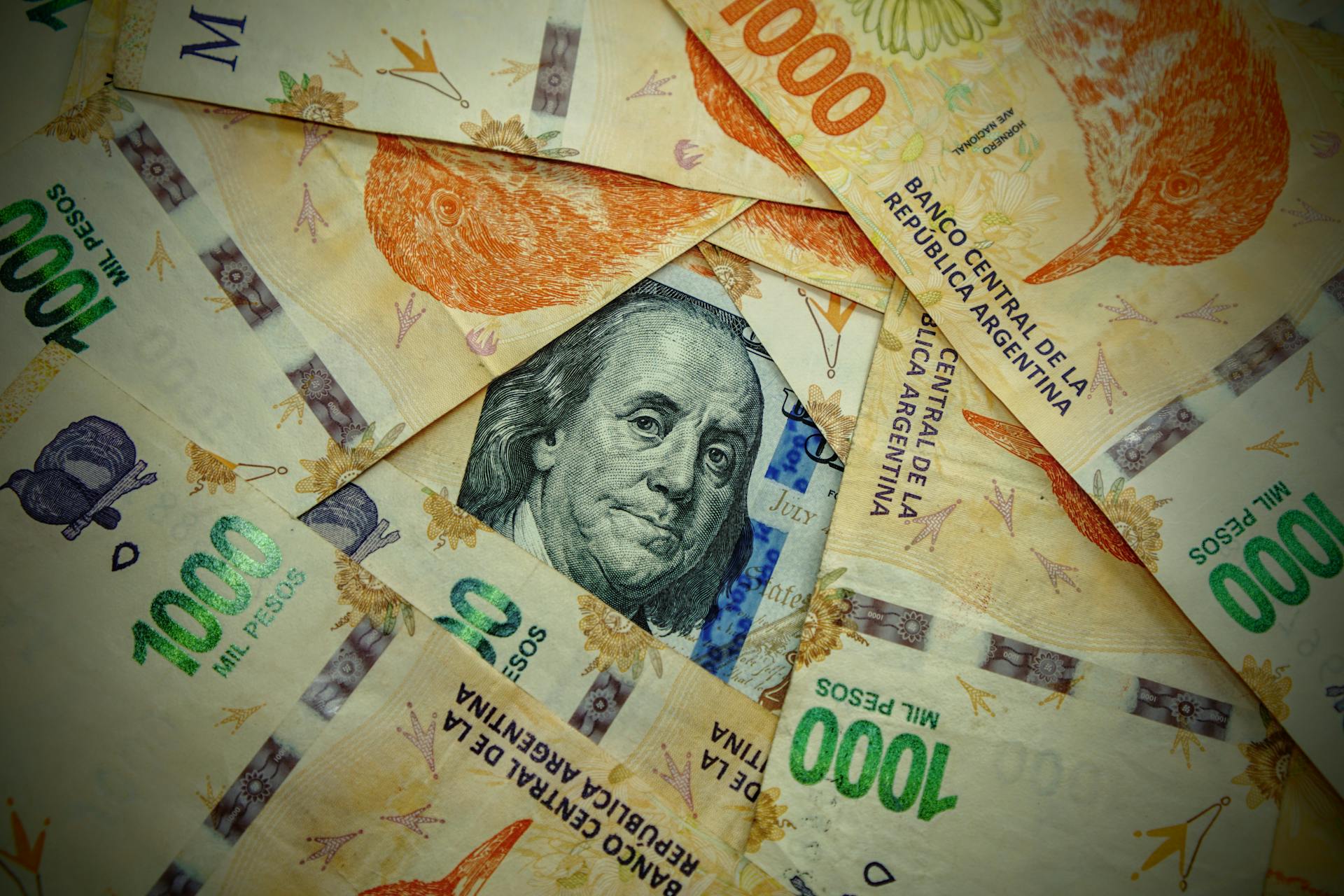
Argentina's economic woes have been well-documented, with inflation rates soaring to over 50% in recent years. This has led to a severe devaluation of the peso, making it difficult for citizens to afford everyday necessities.
The government has implemented various measures to stabilize the economy, but one potential solution that has been gaining traction is dollarization. This involves adopting the US dollar as the official currency, eliminating the need for a separate peso.
By dollarizing, Argentina could potentially eliminate the risk of inflation and currency devaluation, which have plagued the economy for decades. This could also attract foreign investment and boost the country's economic stability.
However, dollarization is not without its challenges, as it would require a complete overhaul of the country's financial system.
Explore further: Argentina Currency Exchange
Benefits and Impact
Argentina's dollarization proposal has sparked intense debate, with some arguing it could bring much-needed stability to the country's economy. The potential benefits are enticing, with dollarization potentially taming hyperinflation, which has soared to 254.2% in January 2024, eroding the value of the peso and crippling economic activity.
Dollarization could also enforce fiscal discipline, eliminating the central bank's ability to print pesos and fuel government spending, potentially leading to more responsible budgeting and reduced deficits. This would be a significant shift, as the current system has led to Argentina's highest annual inflation rate in three decades.
By anchoring the currency to the relatively stable US dollar, dollarization could attract foreign investment, eliminating currency risk and bolstering investor confidence. This influx of capital could stimulate economic growth and job creation, making Argentina a more attractive destination for businesses and investors.
However, dollarization also poses significant risks, including the surrender of monetary sovereignty, which could limit the government's ability to stimulate the economy during downturns. Reduced export competitiveness is another concern, as a dollarized economy could make Argentine exports relatively more expensive, hindering international market competitiveness.
Here are some potential benefits and risks of dollarization:
As the 28th largest exporter globally, Argentina's economy heavily relies on commodities, which comprise more than 60% of its exports. A stable currency environment could attract a wave of investors, further intensifying competition for existing global firms.
Stability and Exchange
Stability is crucial for Argentina's economy, and dollarizing could help achieve it.
Milei, the libertarian economist, believes his proposed "shock therapy" is necessary to resolve Argentina's economic woes.
The US interest in dollarizing Argentina's economy is to have a stable Argentina, a big and powerful South American country.
Stability is Everything
Stability is crucial for a country's economic success. According to economist Hanke, "everything is nothing without stability." This is a stark reminder of the importance of stability in economic decision-making.
Hanke's experience in Ecuador shows that dollarization can be a viable option for achieving stability. In 2000 and 2001, Ecuador dollarized its economy despite having negative net foreign reserves.
A stable Argentina would be beneficial not only to the country itself but also to the United States. Hanke believes that the US interest in dollarizing Argentina's economy is to have a stable and powerful South American country.
Argentina's massive amounts of US dollar cash already make it "de facto dollarized." This is a significant advantage in implementing dollarization.
Exchange Rate Rigidity: Solving or Creating a Problem?
Adopting a fixed exchange rate, like the U.S. dollar, takes away a country's control over its currency valuation, a crucial economic tool.
Countries often adjust their currency value to stimulate trade, making exports more competitive and imports more expensive, but this isn't an option in a dollarized economy.
Argentina could experience ongoing trade deficits if its exports to countries like China, India, or the U.S. decline.
Argentina's economy would be more susceptible to external economic fluctuations, such as changes in global commodity prices, affecting dollar-reliant export sectors.
The agricultural sector, which exported significant amounts of wheat and soybeans to countries like China, South Korea, and India in October 2023, might face reduced competitiveness and market access under dollarization.
Reduced competitiveness could lead to job losses and lower wages, weakening the broader economy.
Check this out: Currency Etf Usd
Operational and Economic Repercussions
Argentina's decision to dollarize may have far-reaching consequences for its economy and businesses. The uncertainty surrounding this move could lead global companies to postpone investments until the dust settles.
Postponing investments could potentially stall short-term economic growth and job creation. This is a concern, as a stable economy is crucial for businesses to thrive.
Exchange rate fluctuations during the transition could disrupt supply chains, impacting the seamless flow of goods and services.
Operational Repercussions
Dollarization in Argentina could lead to operational repercussions, including a potential stall in short-term economic growth and job creation. This is because the uncertainty surrounding dollarization may cause global companies to postpone investments until the dust settles.
Companies may be hesitant to invest due to the potential disruption to their supply chains. Exchange rate fluctuations during the transition could impact the seamless flow of goods and services.
To mitigate these risks, building resilient supply chains that incorporate local sourcing alternatives is critical. This can help companies adapt to potential disruptions and maintain business continuity.
Here are some key considerations for companies looking to navigate the operational repercussions of dollarization:
- Resilient supply chains: Companies should prioritize building supply chains that can adapt to exchange rate fluctuations and potential disruptions.
- Local sourcing: Incorporating local sourcing alternatives can help companies mitigate the risks associated with exchange rate fluctuations.
- Strategic planning: Companies should develop contingency plans to address potential disruptions and maintain business continuity.
By taking a proactive approach to addressing the operational repercussions of dollarization, companies can minimize the risks and capitalize on the opportunities presented by a stable currency environment.
Evaluating Javier Milei's Economic Plan
Javier Milei's economic plan aims to reduce the tax burden on citizens, with a proposed 10% flat tax rate that would apply to all income.
This plan would simplify the tax system and reduce the administrative burden on taxpayers, as seen in the example of Argentina's current tax system, which has a complex structure with multiple tax rates.
Milei's plan also includes a reduction in government spending, with a goal of reducing the country's fiscal deficit.
The plan proposes to achieve this through a combination of measures, including reducing the number of government employees and cutting subsidies for state-owned enterprises.
Milei's economic plan also focuses on promoting economic freedom and reducing regulations that stifle entrepreneurship.
A key aspect of his plan is the privatization of state-owned enterprises, which would allow for more efficient management and increased competition.
The plan also includes measures to promote foreign investment and trade, such as reducing tariffs and increasing transparency in government procurement processes.
By reducing the role of the state in the economy, Milei's plan aims to promote economic growth and increase competitiveness.
Milei's plan has been met with both praise and criticism, with some arguing that it would benefit the wealthy at the expense of the poor.
Lessons and Vulnerabilities
Argentina's experience with dollarization is a complex one, and it's essential to learn from past mistakes. The Convertibility Plan in the 1990s, which pegged the peso to the U.S. dollar, initially brought stability but ultimately led to underlying systemic issues.
Argentina's exports became globally uncompetitive, leading to a ballooning trade deficit. The plan also severely constrained fiscal policy, a situation that would likely be repeated under full dollarization.
Ecuador's experience with dollarization is a case in point. After adopting the U.S. dollar in 2000, its inflation rate dropped from over 90% to single digits, but it became more vulnerable to external shocks.
Zimbabwe's adoption of the U.S. dollar in 2009 stopped hyperinflation, but it also led to liquidity problems and limited control over monetary policy, hindering economic growth. Panama's experience with the U.S. dollar since 1904 is a notable exception, with steady economic growth and stability.
A key concern with dollarization is the loss of monetary policy tools, leaving a country vulnerable during economic downturns and external shocks. This was evident in Argentina's 2001 "Corralito" crisis, which was a stark reminder of the dangers of rigid currency systems.

Here are some key takeaways from Argentina's past experiences with dollarization:
- Argentina's Convertibility Plan led to a ballooning trade deficit and severely constrained fiscal policy.
- Ecuador's dollarization reduced inflation but made it more vulnerable to external shocks.
- Zimbabwe's dollarization stopped hyperinflation but led to liquidity problems and limited control over monetary policy.
- Panama's dollarization has led to steady economic growth and stability, thanks in part to its unique position with the Panama Canal.
Who Benefits from the Exchange?
Argentina's decision to dollarize its economy has sparked a lot of debate about who benefits from the exchange. The truth is, it's a complex issue with multiple stakeholders.
Argentina's adoption of the U.S. dollar may initially bring stability and boost investor confidence, potentially attracting foreign capital and increasing demand for local products and services.
However, the real exchange rate, which reflects a currency's purchasing power in a foreign market compared to its domestic value, is a crucial indicator for both importers and exporters. Argentina's real exchange rate is influenced by factors like aging infrastructure, high transaction costs, and existing trade barriers.
The Federal Reserve focuses primarily on benefiting the U.S. economy, setting monetary policies independently of Argentina's economic volatility, especially under dollarization. This situation leaves Argentina with limited leverage over risks to export sectors such as agriculture and mining, which are highly sensitive to price fluctuations.
For another approach, see: How Do You Exchange Bitcoins for Dollars

Sharp price increases could diminish Argentina's global competitiveness. An unfavorable exchange rate might tip the scales in favor of imported manufactured goods, rendering them more appealing to Argentine consumers.
Here's a breakdown of the potential winners and losers in a dollarized economy:
Argentina's dollarization decision has far-reaching implications for various stakeholders. While it may attract foreign capital and boost investor confidence, it also poses significant risks to the country's export competitiveness and social welfare.
Frequently Asked Questions
Does Argentina have enough dollars to dollarize?
Argentina has sufficient dollar reserves, but the government's commitment to dollarization is the actual limiting factor. The country's ability to dollarize depends on the support of key political actors.
What is the dollar plan in Argentina?
The dollar plan in Argentina allows consumers to use deposited dollars directly, rather than converting them to pesos first, and also enables banks to offer dollar loans to more sectors. This plan aims to simplify foreign exchange transactions and increase access to dollar credit.
How much would it cost to dollarize Argentina?
Dollarizing Argentina would cost approximately $40 billion, a significant financial burden for the country. Acquiring a loan from the International Monetary Fund is a potential alternative to cover this expense.
Can you pay in USD in Argentina?
Yes, USD is sometimes accepted in cities and tourist areas, but it's not the official currency. You may get a better exchange rate by using cash instead of a credit card.
What is the currency problem in Argentina?
Argentina struggles with high inflation, averaging 190% between 1944 and 2023, and has defaulted on its debt nine times, including three times in the past two decades. This has led to significant economic instability and challenges for the country's currency.
Sources
- https://www.cnbc.com/2024/03/15/argentina-must-dollarize-and-abolish-the-central-bank-economist-says.html
- https://www.everestgrp.com/argentinas-dollarization-dilemma-assessing-potential-implications-blog.html
- https://www.npr.org/transcripts/1197956140
- https://www.theguardian.com/world/2023/nov/20/javier-milei-dollar-plan-argentina-economy
- https://oec.world/en/blog/argentina-trade-dollarization
Featured Images: pexels.com

